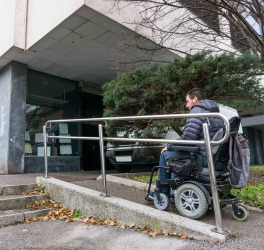
A study done by The Ohio State University Wexner Medical Center and College of Medicine’s School of Health & Rehabilitation Sciences revealed federal autism research funding isn’t following the recommendations of the Interagency Autism Coordinating Committee (IACC).
Study findings are published online in the journal Autism.
The IACC is made up of autism researchers and community members, and is meant to provide recommendations to the U.S. Department of Health and Human Services on how to spend money on autism research and other initiatives.
“As we celebrate World Autism Acceptance Day, it’s important to share our findings that the IACC’s recommendations haven’t made a substantive difference with regard to the types of autism research grants that actually receive federal funding in the United States,” said senior author Brittany Hand, assistant professor in Ohio State’s School of Health & Rehabilitation Sciences.
The researchers mined the databases of the three largest U.S. federal funders of autism research: National Institutes of Health, Department of Education, and Centers for Disease Control and Prevention. From 2017 to 2019, they found 342 federally funded grants totaling just over $159 million for autism research.
The IACC has recommended allocating more funding to research studies focusing on treatments/interventions, evidence-based services and lifespan issues. Historically, studies in these priority areas have received only modest amounts of funding.
The researchers found that funding was actually allocated mostly to biological research, with less than 10% going to services and lifespan issues studies.
“This research is consistent with other studies that show that most autism research funding is dedicated to biological research. We had hoped there would be a difference after the most recent IACC budget recommendations were made in 2017,” Hand said.
This study shows that IACC recommendations alone have been insufficient in changing the types of grants that receive federal funding. Additional strategies may need to be explored to improve funding for lifespan issues and services research, Hand said.
Researchers find it critical to evaluate the extent to which federal tax dollars are being appropriately allocated to the types of autism research funding that the community has expressed a need for. Hand said these findings raise a tough question: “If the IACC’s advice on how resources should be allocated is ultimately ignored by federal funding agencies, what is the point of continuing to have this committee make budget recommendations?”
Other Ohio State researchers involved in this study include Lauren Harris, Daniel Gilmore and Anne Longo.








